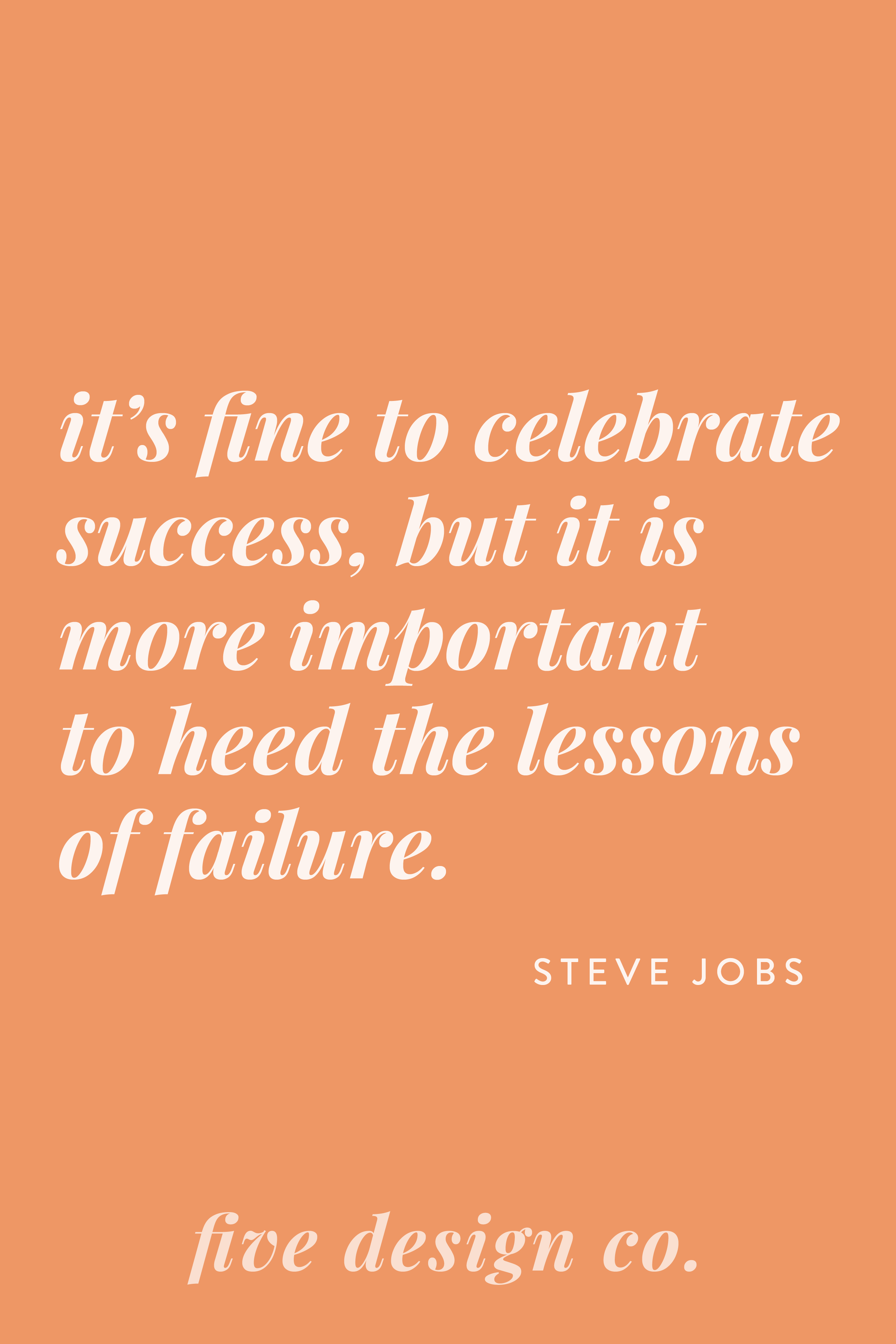10 Lessons Learned from Starting a Business
Hey there! In my work as a web designer, I often give advice to new (or new-ish) entrepreneurs on how to start their businesses. Though there’s no real road map for starting a business of any type, this is particularly true of online businesses, which are in many ways a different ball game altogether, and are also new enough that most of us don’t personally know a ton of online business owners we can learn the ropes from.
In the past two years, I’ve founded two online businesses: Four Wellness Co., a (you guessed it!) wellness company, and Five Design Co., this web design company.
I’ve learned an enormous amount from the process of building, launching and growing each of these. Some lessons came quickly… and others were learned via the scenic route. 😅
For some background, I do not come from a long lineage of entrepreneurs—in fact, when I first left my comfortable corporate job to start a business, my family was not quite sure why I’d do that. It was viewed as being a bit irresponsible to give up a nice salary, health insurance and 401(k)—all to do something with no guaranteed income.
I also have no formal training in business. I have a master’s degree in urban planning, spent years working in non-profits, and most recently managed the marketing department at a hospital in Los Angeles.
(Though my husband, on the other hand, has an MBA, has worked as a mid-level manager for a Fortune 500 company and a tech start-up… and would completely hate my job!)
Which is to say: you don’t necessarily need years of experience or formal qualifications to start and operate a small business.
But, there are some other qualities and behaviors that are helpful (and even necessary) to have success in your new entrepreneurial endeavor.
Here are 10 key lessons I’ve learned from starting two online businesses—and the top tips I now give to the new business owners I work with:
Business tips for entrepreneurs
1. Perfect your elevator pitch
Yes, it’s certainly helpful to have a great elevator pitch for networking situations and presenting your business to others, but that’s not actually the reason I’m listing this as “important business tip #1.”
The real reason is: if you can’t succinctly, articulately (and passionately!) describe what you do and how you do it… you shouldn’t be doing it at all.
To get started with a strong foundation for an online business, you have to:
Know what exactly you offer of value
Be able to describe it to other people in a way that they understand
Here’s an example from my own life. When people ask me what I do, I can answer:
I’m a web designer. I help small business owners build websites that grow their business and brand.
Not the most amazing elevator pitch ever, but it tends to work well for a few reasons: 1) it’s brief; 2) it pretty clearly describes what I offer of value; and 3) it allows for open-ended connection that gets people interested and talking. It’s amazing how many people respond by telling me that they or somebody they know needs a website, or asking me what I think of their company’s website that just got redesigned, etc.
In order to move forward with your business idea, you have to know what you’re doing, how and why you’re doing it, and how to connect with other people on it.
2. Build your business around things you *like* doing
I’ll be honest: the first business model I used for Four Wellness Co. was really awesome (if I do say so myself 😉), with one fatal flaw: I didn’t like doing the bulk of what I would’ve needed to do to sustain it. (Be an online health coach.)
Health and wellness are incredibly important and interesting to me, and I’ve certainly spent plenty of time helping others with their health concerns over the years, but I’ve learned that some things we can enjoy on a hobby level, while not necessarily enjoying them on a full-time work level.
My second business, Five Design Co., became much more successful much more quickly because I actually enjoy the daily tasks and responsibilities involved, and they fall more suitably into my wheelhouse.
There’s an Oprah quote I think sums this up nicely:
3. Perseverance is essential
Business growth is most likely not going to come quickly. And it’s important to know that!
Only half of new businesses survive to the five-year mark. This isn’t simply because they’re terrible business ideas. Some might be fantastic business ideas with a ton of potential—that their founder just gave up on too quickly.
If you’re looking to start a successful business, it’s important to settle in for the long-haul. (True, some people get lucky and their business blossoms very quickly, but that’s more the exception than the norm.) More often than not, it takes quite a bit of back-end toil before reaping any sort of benefit.
Succeeding in business requires sticking with it through the tough times—those early months/years where it feels like you’re not accomplishing anything.
Here’s a real-life example: Jeff Bezos founded Amazon in 1994 and it almost went bankrupt in the early 2000s. Yes, Amazon almost ended about a decade before you even knew it existed. If Jeff Bezos had thrown in the towel during the tough early years, there would be no Amazon Prime today.
Not that Amazon-level size and power is what we’re all going for, but you get my point: giving up too soon doesn’t get you very far.
But, that said…
4. Know when to pivot
This is one of the trickiest things to learn as a new business owner, but there is a fine line between waiting out the tough times of a great business idea, and holding on to a flawed business idea.
Sometimes, there truly is something significant that’s hindering your business growth—might be your product or business model, or branding, or how you’ve structured operations.
In small business, it’s almost essential to use trial and error as a method of narrowing down what works best for you, in your market. There’s really no quicker way to it.
So, sometimes you find yourself on the “error” side of that equation.
As a new business owner, it’s important to be able to recognize when that’s happening—when things aren’t just growing slowly, but truly not growing at all.
At that point you look at your business and try to pinpoint what’s not working. This is really challenging (almost impossible) to do while you’re in the thick of it, and I’ve had to step away and get out of the weeds in order to have the broader perspective needed to even see the problem—and then gain clarity on potential solutions.
5. Be okay with failure
The truth is: when you start a business, you’re likely going to fail at some (likely many!) aspects of it.
It’s important to recognize that you’re going to fail (a lot!) and get comfortable with that. Not complacent—repeated failure doesn’t equate to business success—but willing to fail in order to learn the lessons necessary to continue moving forward with better, stronger ideas and methods.
There’s interesting evidence (popularized by Malcolm Gladwell in his book David & Goliath) that people who are more familiar and comfortable with failure can end up being more successful because of it—the theory being that because they’re more used to failure and less discouraged by it, they don’t give up so easily.
I don’t just mean failure as in “failed to become successful quickly.” There are other very real and tangible failures that can come up along the way: failing to meet a deadline, or please a customer, or deliver on a business promise, or handle an employee issue well.
Failing can feel demoralizing, but it’s incredibly important to accept that it’s part of the process—and, in fact, can teach some of the best lessons that ultimately set you apart in building a better and more resilient business.
Some of the greatest innovators of our time share this useful perspective on failure:
6. Know your audience
And, no, your audience is not “everyone.” 😁
We have an entire post on how to define your target audience (and why it’s so important to do that), but I’ll just summarize as: the internet is a giant place and it’s not worth trying to cast too large a net.
Particularly for newer and smaller businesses, it’s more cost-effective and a better use of your time and resources to narrow down a clearly defined target audience and go after them with intention.
7. Invest in a proper desk & workspace
When I first left my job to start a business, I worked out of an arm chair in the living room of my (cute but impractical) one-bedroom apartment. Several months of back pain and chiropractic work later, my husband and I moved to a larger apartment specifically so I could set up a proper home office.
I very strongly recommend setting up a comfortable and enjoyable workspace—particularly if you’re looking to make your business your full-time job. Not just because an ergonomically correct set-up is important for your health and will save a lot of physical pain down the road, but also because you’ll be more inclined to work in a comfortable and suitable workspace than curled up in an unreasonable position you can’t sustain all day everyday.
P.S. I wrote a list of tips for workplace wellness that may be helpful too!
8. Set daily, weekly & monthly goals for yourself
As a small business owner, your To Do List will be miles long, with an incredibly wide range of tasks—including many you’re not used to (or necessarily comfortable) doing. It can become quite overwhelming!
I like to stay on track by structuring my work around specific, tangible goals. For example:
research photographers / schedule brand photoshoot
set up LinkedIn business page
write/schedule 2 blog posts
When you’re just starting out, I actually think that annual goals are too nebulous to be useful at a smaller scale. Especially in your first year of business, your goals and methods may change dramatically between the first and twelfth month, as you learn and adjust along the way. Though it’s certainly useful to establish broader business goals and objectives so you know what you’re working toward, I recommend breaking down your goal structure into monthly, weekly and daily goals.
Despite all the technology I employ in running my businesses, I like to do this the old fashioned way: though I do keep a running list of business projects and “to do”s in Airtable (not so old fashioned), each month I write my key goals/projects for that month at the top of the monthly calendar in my planner.
I then outline how the projects will flow through the month, assigning specific projects/tasks to each week. I write these weekly priority lists in the Sunday spaces of my monthly calendar.
Then, each week, I revisit my weekly priority list I made at the beginning of the month and fill in the remaining calendar blocks for that week with which specific piece(s) of the weekly goals I’ll work on each day.
This method helps to set and highlight priorities for each day, while also keeping the daily pages of my planner clean for my full list of tasks.
9. Invest in a great website
I’m not just saying this because I’m a web designer and my livelihood is designing websites for other small businesses and entrepreneurs (wanna chat?!).
But I do firmly believe that, especially for online business owners, your website is the single most important piece of growing your business.
If I didn’t have a functional and professional website that explained to potential customers what I do, how it can help them, and how they can get started… I wouldn’t have a business!
Sure, a website is extra essential for a web designer, as it’s also showcasing my craft, but it’s still essential for any other industry that aims to connect with potential customers via the internet.
With an online business, you need to a) find potential customers, b) woo them, and c) convert them—all via your website.
10. It matters less what you start with & more what you do with it
There are a lot of perceived limitations people allow to get in the way of changing careers or starting a business. Have you felt any of these?
I don’t have enough money to leave my job.
I don’t have any business training.
I don’t have any clients/customers.
I’m too old to change careers.
I invested too much in my education and shouldn’t throw it all away.
I don’t have enough time to have a side hustle.
Now, it’s of course important to make reasonable financial and professional decisions—often, that involves saving up for a new business venture, discussing it with your spouse, doing research, creating a business plan.
But anyone can find some excuse for not starting a business—whether that’s money or time or confidence. I can attest that I personally did not have much money or time or business confidence when I first started mine.
But it doesn’t matter so much the point at which you start at. We all have challenges and we all have obstacles we need to overcome for business success. (Elon Musk famously slept on his friend’s couch when he ran out of money keeping Tesla and SpaceX alive.)
What matters most is whether you have the drive and perseverance to overcome your obstacles, rather than letting them overcome you.
Squarespace Website Checklist
Create a professional website to grow your business & brand
Get my free checklist for DIY-ing your dream Squarespace website:















